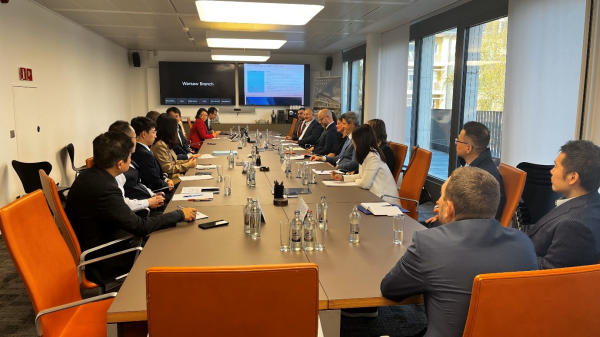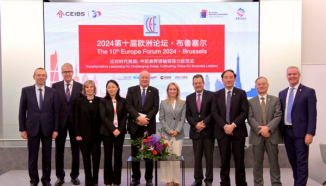专访:瑞典专家称“一带一路”给欧洲带来实实在在的利益,揭穿“脱钩”谬论(英文全文)
8月16日,瑞典“一带一路”研究院(BRIX)副主席侯赛因·阿斯卡里(Hussein Askary)在瑞典斯德哥尔摩接受新华社记者采访时表示中国共建“一带一路”项目给欧洲国家和人民带来了实实在在的利益,戳破了所谓“脱钩、去风险”的谬论。
以下为英文报道全文:
STOCKHOLM, Aug. 16 (Xinhua) -- The projects proposed by China under its Belt and Road Initiative (BRI) have brought tangible benefits to the countries and peoples of Europe and helped debunk the so-called "decoupling and de-risking" fallacies, a Swedish expert told Xinhua in a recent interview.
From the Port of Piraeus in Greece to the Bar-Boljare highway in Montenegro, from the Peljesac Bridge in Croatia to the Hungarian-Serbian railway line, the BRI, which marks its 10th anniversary this year, offers numerous examples of benefit-sharing in an environmentally friendly way, said Hussein Askary, vice chairman of the Belt and Road Institute in Sweden (BRIX).

Hussein Askary, vice chairman of the Belt and Road Institute in Sweden (BRIX), poses for a photo in Stockholm, Sweden, on Aug. 16, 2023. The projects proposed by China under its Belt and Road Initiative (BRI) have brought tangible benefits to the countries and peoples of Europe and helped debunk the so-called "decoupling and de-risking" fallacies, a Swedish expert told Xinhua in a recent interview. (Xinhua)
"These projects are contributing greatly to connectivity in Europe, with high quality, low-cost and reduced construction time," he said, adding that the Chinese companies are "superior in terms of quality", and that the examples of successful and high-quality Chinese participation in European infrastructure construction are abundant.
Besides, the clean public transport projects contribute greatly to the reduction in the use of private cars, and thereby to efforts to ease congestion and combat pollution, he added.
Commenting on the West's "decoupling" and "de-risking" push, Askary said that this was "concocted by politicians who are not really in touch with the economic realities of their countries and communities," and that "the aim of these schemes is, of course, to undermine China's and the BRI's achievements."
"The reality is that the economies of the West and China and the global supply chains are so entangled, it would be suicidal for any economy to decouple from the others. Such plans will fail utterly because they are impossible to implement," he stressed.
Askary also refuted Western media's "debt trap" allegations on the BRI, saying that "there are three fallacies in the 'debt-trap' narrative when examined closely."
First, in terms of the cause of the debt, countries in debt distress today were often in a debt trap before the BRI came on the scene. The reasons are the economic and financial crises caused by natural disasters, terrorism, wars or civil wars, and pandemics. Then comes the mismanagement of the finances of these countries often in cooperation with the International Monetary Fund and the World Bank, with conditionalities, such as austerity, reducing public investment, and privatization of state assets and utilities.
Second, in terms of debt ownership, BRIX's research showed that 80 percent of Sri Lanka's, 70 percent of Pakistan's, and 77 percent of Zambia's external debt is owned by Western private and public institutions, while China's share in 2022 was 10 percent, 15 percent, and 17 percent, respectively, for the three countries. Furthermore, both Sri Lanka and Zambia defaulted upon payments of "sovereign bonds" owned by Western private corporations, not upon Chinese loans.
Third, in terms of the nature of the debt, while Western loans are often short-term with high interest rates and lead to unsustainable cycles of indebtedness, China's loans to developing countries are long-term and low-interest credits contributing to improved infrastructure, which in turn lead to increased productivity and economic growth, thus to greater wealth and income for these countries, enabling them to service their debt comfortably.
"Therefore, there is a 'qualitative' difference between Chinese and Western loans. Chinese loans should be considered a 'debt-relief' not a 'debt-trap'," he stressed.

 登录
登录 欧盟中国商会金融工作组与高伟绅律师事务所在卢森堡联合举办“欧盟银行业监管动态专题圆桌会”
欧盟中国商会金融工作组与高伟绅律师事务所在卢森堡联合举办“欧盟银行业监管动态专题圆桌会” 应对时代挑战:中欧商界领袖领导力新范式——2024第十届中欧“欧洲论坛”在布鲁塞尔和上海双城连线举办
应对时代挑战:中欧商界领袖领导力新范式——2024第十届中欧“欧洲论坛”在布鲁塞尔和上海双城连线举办



